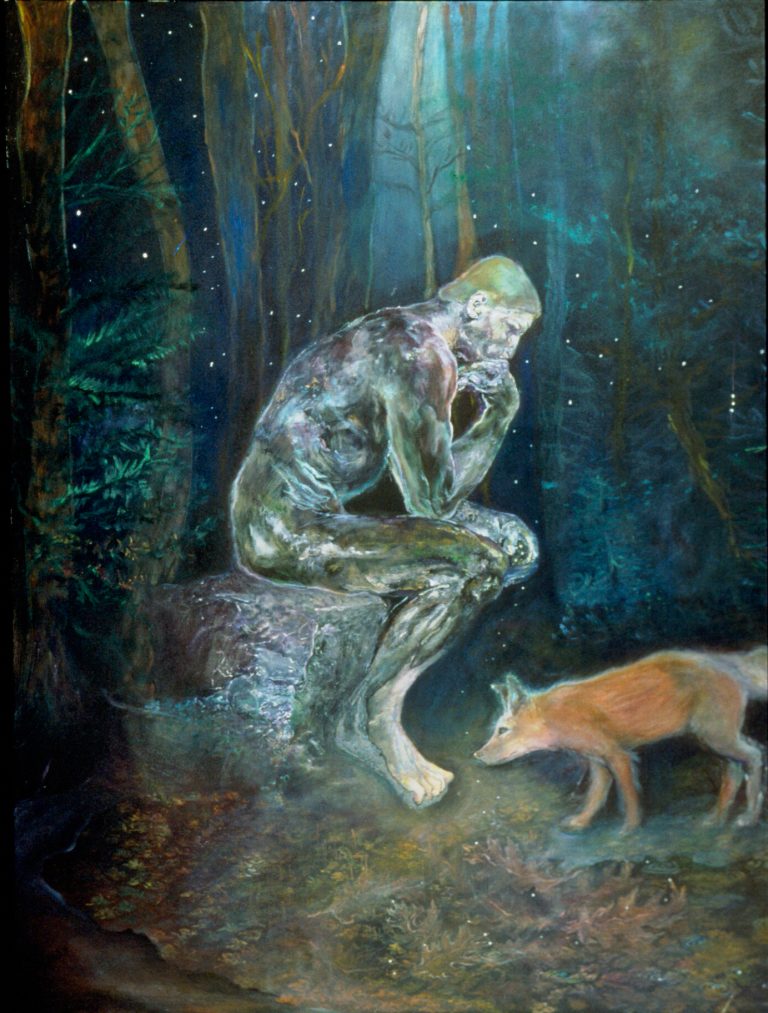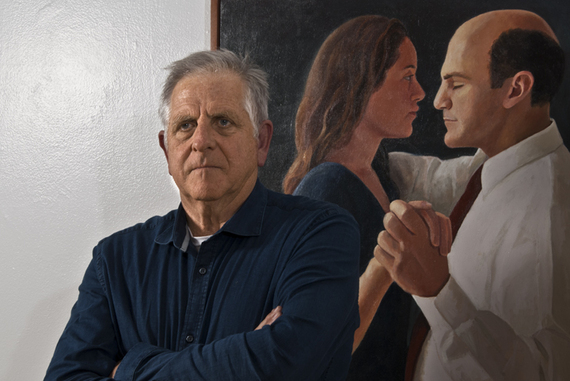My Conversation with artist Ruth Poniarski
Ruth Poniarski is a painter and the author of Journey of the Self: Memoir of an Artist (Warren Publishing, 2020), in which she tells the story of her decade long struggle with mental illness, a “spiraling malady” which led her into a “pattern of psychosis”. I recently had the opportunity to talk with Poniarski about her life and work, and how she eventually overcame her demons.

Your mental health woes began as you tell it when you unwittingly ate a brownie laced with PCP. You had the first of many breakdowns that night in 1977. Do you believe the PCP was the direct cause of your illness?
What happened was in my sophomore year in college I began to indulge too much in marijuana. One night I blacked out. After that I eliminated pot entirely from my life. The paranoia and depression lingered on even though I stopped marijuana cold. During my senior year my boyfriend was away and I was at a loss for a friend. At the end of a party I was given this brownie. I had a predisposition to the affects of the PCP. That set me off. I spiraled into a pattern of psychosis. It was very frightening. You need to remember that back in 1977 psychiatry was not as developed as it is today. Sophisticated medicines were not there.
Is there anything you would like to share about your childhood and upbringing? Were you exposed to art early on?
My mother was a little bit eccentric. She took me to a life-drawing class with a nude model. I rendered this woman. I was able to get the torso very well and then I lost my concentration, and it look like a Picasso drawing. Very advanced for my age. After that it kind of was in me to be an artist. It really influenced me inadvertently in taking up painting later on in my life.
Your story emphasizes the importance of having a proper support group. Undoubtedly many people suffering with mental health issues are dealing with the same issue. Can you speak to that? How did your life change when you found the right support? What did it take to put that support in place?
For the first seven years of my illness I was seen by a psychiatrist, Dr. Samuel. He always told me to find friendships outside of my parents. But I wasn’t open about my mental problems with friends because I thought they would shun me. That caused me to be very alone. In 1984 I found George, another psychiatrist. From the beginning he included my parents in therapy. My brother was in the army. When he was around he also met with George. Right away the tone of the therapy with George consciously developed support with my family and subsequently I was able to find friendships that were healthier.
You’ve written a memoir, an account of your struggle with mental illness, and with apparently incompetent doctors, and how you finally recovered your life. Did the process of writing itself change your outlook at all? Did it have an effect on the way you understood your story?
When I initially started writing the book it was to be the personal story behind the paintings – but as I developed writing this it was very therapeutic. I had the opportunity to look back at myself, to disengage myself from myself. I was able to actually show myself the cyclic pattern I had fallen into. I was able to look. I cannot emphasize enough the importance of keeping a journal, especially in stressful times.

What have you learned from your personal struggles with mental illness? If you could share one thing with those who may be dealing with similar challenges what it would be?
First, you have to identify the problem. Talk to somebody: when I felt my demons coming on I would talk about it. Never give up. It took me thirty years to find the right dosage of medication. Thirty years. But I never gave up. I always went on and on and on. Research as much as you can. Read about it – including autobiographies, which helped me to see that I was not alone. Cling to something higher than yourself. Imagine it. And keep a journal. In my book I inadvertently deal with the issue of suicide. And my theory on suicide is that you could lose your sense for a half an hour and be unlucky and able to kill yourself. But if you don’t kill yourself you have the chance to redeem yourself and get better. You have to have someone to talk to.
How do you see the relationship between art and mental health? Generally speaking, but also in terms of your own life. Do you view art as essentially therapeutic? Can it restore us to health and wholeness? Is that part of what you want to achieve?
Yes, on a couple of different levels. I am able to channel my very active imagination. I mean you could tell when I was breaking down and having a psychosis and I was imagining that a revolution was happening. My mind was unchecked. I did not really start making art until 1987. In 1988 I really started to develop art as a profession. I was able to channel my imagination. It gave me a sense of creative purpose. I was able to focus on being very disciplined. The painting made me grounded a little bit more, to take it a day at a time. It gave me the avenue to channel my imagination. George would say ‘don’t put bunions in your head’ – in other words, don’t put obstacles in your way. Take things an hour at a time. Don’t think thirty years ahead. Set small goals. The paintings were small goals – each day I would do a little part of a painting. And I would build it up to a full picture. I would develop the story as I went along. I started a painting with several images and then I would develop the story.
Your art involves a kind of personal mythology one might say. You draw on certain motifs that appear and reappear in your paintings. What draws you to these motifs? How did you develop your personal vocabulary?
It took a period of time. The image on the cover of the book was one that I painted in 1990. That painting was the mother of all my surrealist paintings that followed. Originally, it was a picture of me holding my infant son. The infant is modelled on Rembrandt’s mother’s face. My face is modelled on da Vinci’s Mona Lisa. You are holding your old self. She is embracing is her older self. We carry our old selves with us, our old experiences.
One notices that there are certain artists you like to quote as it were, including Rodin, but perhaps none more than Rembrandt. What is it about a Rembrandt’s Woman Bathing in a Stream from 1654 that you keep coming back to this figure?
I was influenced by Rembrandt and his biblical storytelling. That influenced me in portraying contemporary storytelling. That bathing figure first appeared in my painting The Milking of Spring (1994). I really adored that figure – I don’t know how else to put it. By the way all my paintings have poems. There is a poem called Transformation and that is about a painting of a Rodin sculpture, the Thinker, in a forest and he is touched by a fox. His foot becomes flesh. He is painted in bronze, but his foot becomes flesh from the moment that fox sniffed his foot. I use animals as part of my language.
Certain animals – lions, for example – reoccur in your paintings. In one painting (Rousseau’s World) a woman finds her reflection as a lion in a pool of water.
The lion is very regal. After a while I developed a language with the animal. I love animals so much. Bringing up my children we had five dogs at one time.
You come from a Jewish background. What role has Judaism played in your art and your development as an artist?
Biblical stories – especially from the book of Genesis – left an indelible imprint on me. When I was sixteen years old I made a trip to Israel. That was in 1972. One of the best summers I ever had. I spent half a week on a kibbutz – that also left an imprint on me. My husband’s parents were holocaust survivors. They lost their entire families. They met in an Italian concentration camp; and were the last to be filmed by the Shoah Foundation. My in-laws’ experience and story had a major impact on me.
Sleep seems to be a reoccurring theme for you. Rest, repose, and also dreams — I know part of your struggle was with insomnia. Staying up for days on end. So sleep is an understandably important theme for you. Would you care to comment on this?
Sleep to me is the most important element of living. When you go to sleep you’re able to dream. Even if you don’t remember your dreams you’re able to work out the illogical, irrational thinking in your sleep. There are a lot of people who get four hours of sleep. I don’t think that is enough. I think a human being needs between seven and nine hours of sleep. Sleep is like food. Insomnia is a big problem in the United States. When I lose my sleep that is when my demons come. I go to bed at the same time every night religiously. I try not to have any caffeinated beverages from three o’clock on. I try not to stimulate myself too much before I sleep. When I go to sleep I do say a prayer – I lean on something that is higher than myself.


